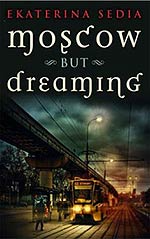
![]() booksbrainsbeer
booksbrainsbeer
1/22/2014
![]()
Last week I finished reading Moscow But Dreaming by Ekaterina Sedia. Simply put, Sedia and Karin Tidbeck have changed my attitude toward short stories. Prior to reading Jagannath and Moscow But Dreaming, I turned up my nose at the form, an attitude that originated, I suspect, during an American lit class in which I was enrolled as a college frosh. "But the scorched grasshoppers in Hemingway's story are symbolic of World War I veterans, you see..." No. I didn't see it. And I wrote in my blue book until my hand cramped. It still aches before rain.
But Tidbeck and Sedia have made me believers. I ignore my previous errors and instead advocate on their behalf with the zeal of the newly converted. Tidbeck and Sedia, you see, are practitioners of the "new weird," a genre with which I'm entranced and is, I suspect, best suited by the medium of the short story.
Moscow But Dreaming opens with "A Short Encyclopedia of the Lunar Seas," a dreamy travelogue in which the moon's "seas" are described, including both their particular qualities and the behavior of their natives. Sedia lets you know that you may check reality at the door and prepare to encounter the fantastic.
Sedia's subsequent stories are less experimental but no less powerful. In the masterful "The Bank of Burkina Faso," Sedia uses as inspiration the e-mail scams to which readers have all grown accustomed, finding in them kernels of economic and spiritual truths. "One, Two, Three" draws on Eastern European folklore and brilliantly sets the stage for its events while avoiding predictability. I was charmed by "Chapaev and the Coconut Girl," about a Russian expat's efforts to construct artificial intelligence based on a Bolshevik war hero and a Polynesian myth.
Myth, folklore, and history figure prominently in Sedia's writing. As might be expected, given the book's title, Russia is the focus of many of the book's stories. In "Tin Cans," an elderly man confronts the ghosts of Russia's Soviet past. My personal favorite, and the one that ends the book, is "A Handsome Fellow," about a romance that takes place during the siege of Leningrad. This story, too, avoids going where the reader expects.
Moscow But Dreaming is a wonderful collection of the weird and fantastic. Sedia's stories are dark and surprising. The influence of Russian (and world) folklore is welcome and is well integrated into the stories. Highly recommended.
http://booksbrainsandbeer.wordpress.com/2013/12/04/review-moscow-but-dreaming-ekaterina-sedia/